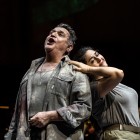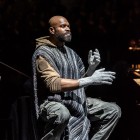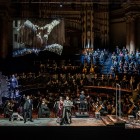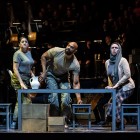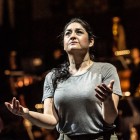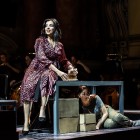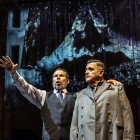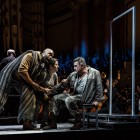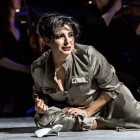Aïda 2019Opera North
Read more about the opera Aïda
Opera North in Scotland
Opera North has presented several concert stagings in recent seasons, beginning with Wagner's Ring. After that, in 2017, they contributed Turandot, conducted by the once familiar figure of Sir Richard Armstrong, and directed by Annabel Arden. Armstrong and Arden collaborated again on this Verdi production, in the company's first visit to the Usher Hall.
Aïda
This Aïda was a more spectacular enterprise - not that Salome (given in Perth a few months before) is in any way easy - but the director and her team had to arrange the platform so that there was room for the chorus, plus a large projection screen to the rear.
There also had to be space for the soloists to move around and act. And of course the teams of trumpeters had to be able to enter in file and add their brilliance to several scenes. So it was a logistical nightmare, even without making it work as drama - a thing that many fully-staged productions of this deceptively difficult opera fall well short of.
No need to worry here. It was all worked out beautifully. There were atmospheric projections. Even simple things like the tall statues of the two kings underlined highly effective drama. All the performers came over as uninhibited actors at ease in the orchestral surroundings.
Well balanced and powerful
For the performance of Verdi's music. only superlatives are in order. Richard Armstrong has always been an expert Verdian, but his fierce sense of attack, dramatic rhythm and control of dynamic made this a hugely exciting evening. The obvious hits like the blazing choral music in the Triumph were astonishing in their impact. Huge credit must go to chorus master Oliver Rundell for the tremendous performance from his forces - there were so many familiar Scottish names in their ranks that the Scottish exiles from Macbeth almost came to mind. But the quiet atmospherics also worked well with beautiful solo work from the orchestra from the prelude onwards, and especially in the Nile scene.
Rafael Rojas has appeared regularly with Opera North for many years, singing large sectors of the Italian repertoire. His only Scottish appearance came when they brought Puccini's La rondine for its Scottish premiere in Aberdeen. In those days he was a lyric tenor, but the voice has filled out nicely to suit the clarion tones required here.
Alexandra Zabala came to the Edinburgh Festival a couple of years ago in the Turin staging of Macbeth. That had not prepared us for the beautiful sounds - unusually sweet-toned and gentle in the soaring 'O patria mia'. She is a lively actor and much use was made of the contrast in height with her stage father. Eric Greene, that Amonasro, is tall enough to dominate the stage with ease, sang with an unusually lyrical tone - and he presented a lithe, agile figure on stage.
The Amneris was another unfamiliar figure, Alessandra Volpe. The role is a gift for a dramatic performer with the necessary vocal power. However far too often it is taken by ambitious young mezzos who struggle with the majestic outpourings of the trial scene. Here there was no need for the audience to worry, and the big moments were carried off with ease, in what became an involving and thoroughly sympathetic performance. Her father, the King, made more of an impact than this role usually does.
Another important aspect of the casting was the contrast between the two basses. Michael Druiett's King had a softer grain to his vocal production, where Petri Lindroos's black-toned Ramfis sounded as though carved from granite. He is clearly another in the succession of wonderful Finnish basses and it is to be hoped that he will return frequently.
In all this was a hugely enjoyable presentation. The only cause for sadness and wonder is that the Usher Hall was not packed out for such a popular work.

